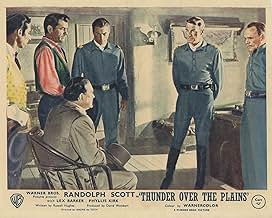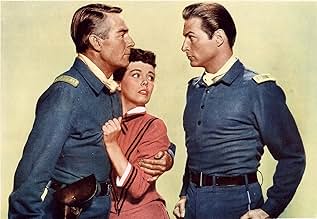Adicionar um enredo no seu idiomaIn Post-Bellum Texas, an army captain tries to keep the peace between overtaxed, impoverished farmers and greedy carpetbaggers.In Post-Bellum Texas, an army captain tries to keep the peace between overtaxed, impoverished farmers and greedy carpetbaggers.In Post-Bellum Texas, an army captain tries to keep the peace between overtaxed, impoverished farmers and greedy carpetbaggers.
- Hodges' Sergeant
- (não creditado)
- Texan
- (não creditado)
- Walter Morgan
- (não creditado)
- Trooper
- (não creditado)
- Texan
- (não creditado)
- Kehoe
- (não creditado)
Avaliações em destaque
When the north defeated the south during the civil war, unfair practices were being exercised when southern farmers were unfairly overtaxed as opposed to regular farmers living in the north, forcing some to give up land easily belonging to them by auction. Fictionalize story line based on fact that if there is any reason to watch this film, it would only be for the history lesson. The action is not a plenty, but well- known Western actor Randolph Scott's tall, valiant screen presence keeps the film from becoming boring. This is the fourth of six movies Randolph Scott collaborated with director Andre De Toth.
First, there's an intelligent script by Russell Hughes, who wrote for some good radio shows like "Nightbeat" and Alan Ladd's "Box 13", as well as such films as Anthony Mann's "Last Frontier", Delmer Daves' "Jubal", and even the best of the giant-bug movies, "Them".
Then, there's the look and feel of the film. Director Andre De Toth and his great cinematographer Bert Glennon (who had done remarkable work with the likes of Josef von Sternberg and John Ford) light and shoot for realism and emotional impact. Glennon had also shot "Man Behind the Gun" (available on the flip side of this DVD), so I suppose director Felix Feist could be blamed for that film's phony-looking stage sets. Here, in "Thunder... ", a barroom scene looks like it was shot in a real barroom (foreshadowing Clint Eastwood's "natural lighting" technique by decades) and exteriors are shot outdoors. To be fair, the Feist film may have had budget or producer issues, but given that film's potential (dealing with water rights, corrupt politicians, the possible secession of southern California, even the semi-legendary Joaquin Murrietta as a supporting character) it still seems like a typical, entertaining, 40's-style B-movie. "Thunder...", released the same year, 1953, seems more forward-looking, more compelling, more of the age of the "adult" Westerns, even though the literally flag-waving ending with its narrative paean to the great state of Texas kind of pulls us back to B-movie-land.
Thunder Over The Plains sags just a bit in the middle, but has great production values and is fairly ambitious for a 1950's B-western, with some pretty complex characters. The cinematography and direction by Andre De Toth are excellent.
Elisha Cooke Jr. is pretty good as a sniveling tax collector. Lex Barker's character is especially vile, kind of a surprise considering the times in which this was made and the fact that Barker is so handsome and all-American looking!
It's 1869, and Texas is still not part of the Union. Carpetbaggers rule the state and criminal activity is high. Captain Porter (Scott), a proud Texan himself, finds he has to carry out orders against his own countrymen. When a man in town is murdered in cold blood, suspicion falls on rogue cowboy Ben Westman (McGraw), but Porter believes he's innocent and strikes a deal to bring him in for a fair trial. However, this sets off a chain of events that leads to Porter himself becoming a wanted man.
Knowing direction, fine acting and a darn good script, all make Thunder Over The Plains essential viewing for the 50s Western fan. The bonus, aside from the impressive support cast, is the story itself. This was a troubled time, a time when only two states were not yet accepted back into the Union post the Civil War. Toth and Hughes paint a murky town, one of corruption, tax oppression and shifty shenanigans. There's even room in the story for strains on the family home of Porter and an attempt at adultery. Throw in the nice colour and scenery, pace it briskly with enjoyable action set-pieces (the shoot out at the end is familiar but excellently done), and it's a fictionalised winner. 7/10
Você sabia?
- Erros de gravaçãoGrowing cotton and transporting cotton bales thru the hilly countryside was a foolish director's scheme. In 1869 cotton wasn't grown within 1,000 miles of this area.
- Citações
Norah Porter: Whatever became of Frances Bilky?
Captain Bill Hodges: I don't know. She married a colonel, I think. Maybe it was a general. At any rate, she outranks all of us.
Norah Porter: But that's wonderful! Now she'll have her lifelong ambition to lead the cotillion. Well, I guess that's what I always wanted too.
Captain Bill Hodges: You don't have anything like that around here, do you, Captain?
Captain David Porter: Oh, I don't know. The Indians come down once a month and dance for us.
- ConexõesReferenced in O Ouro Maldito de Las Vegas (1968)
Principais escolhas
- How long is Thunder Over the Plains?Fornecido pela Alexa
Detalhes
- Tempo de duração
- 1 h 22 min(82 min)
- Proporção
- 1.37 : 1





































